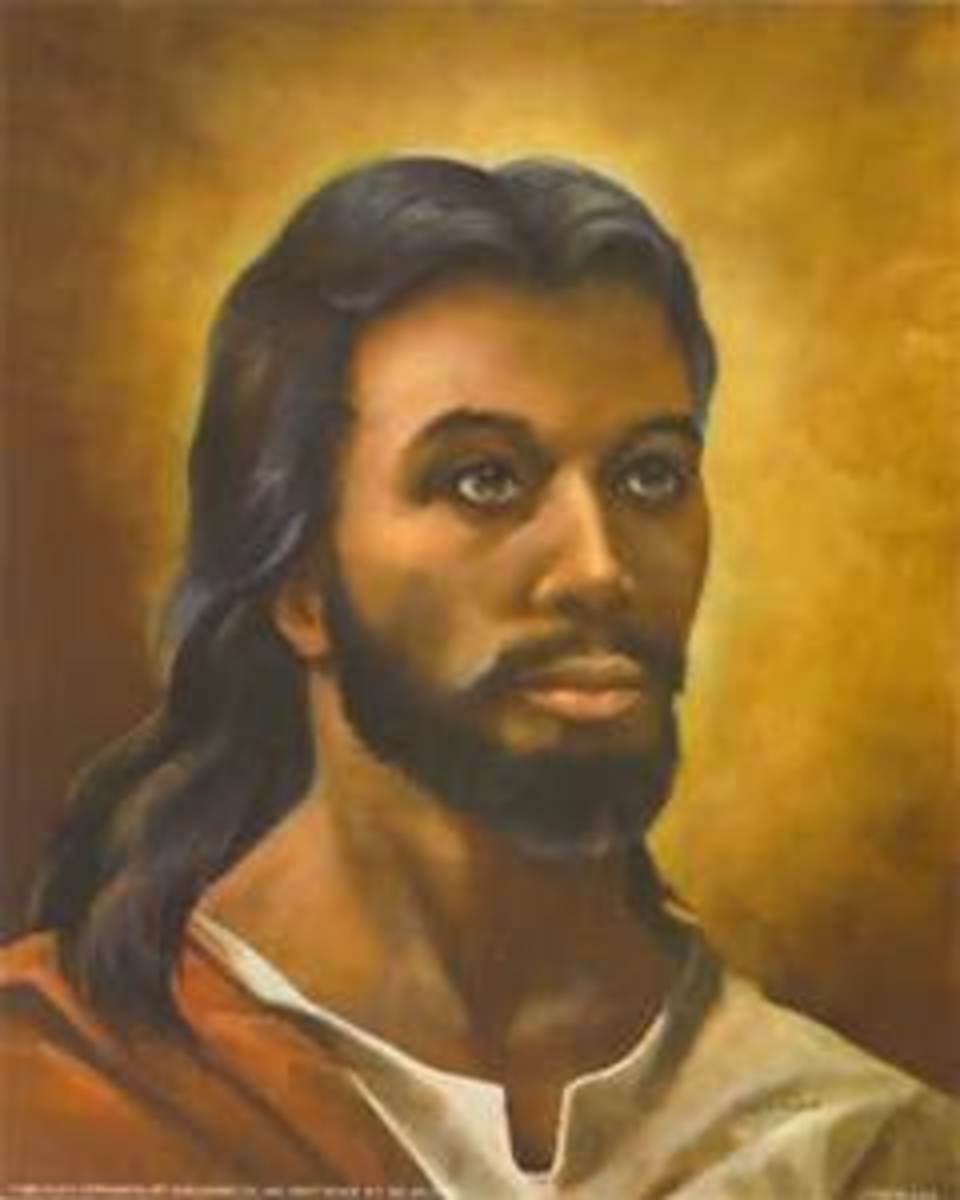Bible: What Does John 7 Teach Us About Jesus, the Feast of Tabernacles, and the Water of Life?
The Feast of Tabernacles (Sukkoth)
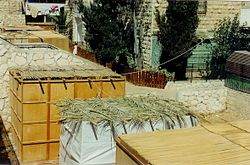
"My Time Has Not Yet Come"
view quiz statisticsRejected by His Brothers
Several months later, Jesus carries on His ministry in Galilee, avoiding any confrontations with His would-be murderers in Jerusalem (vv. 1-2).
[In chapter six, the Passover, a Spring feast, was near (v. 4); here, the Feast of Booths [Tabernacles], an autumn pilgrimage festival, was at hand (v. 2).]
However, He is dealing with certain people who still do not believe He is the Messiah: His half-brothers (v. 5).
They tell Him to leave home and go to Judea where His disciples and the rest of the world can witness His works (vv. 3-4).
[His half-brothers seem to indicate some doubt about the Lord’s PR strategy (v. 4).]
Christ begins and ends His response to them with the clause “My time has not yet come” (vv. 6, 8).
[Verse 8 includes “fully” between “yet” and “come,” qualifying His meaning to signify that His “time” is approaching.]
They can go to this feast at any time (v. 6b); Jesus, however, as the object of the Jews’ hatred, must choose wisely when and how to attend Tabernacles that year.
However, He also had His eye on a future Passover.
For the time being, He is staying in Galilee (vv. 7-9).
The Apostle John does not record how soon after this conversation that Jesus’ brothers travel up to Jerusalem, but they make the trip without the Lord (v. 10a).
Christ leaves shortly after they do, but goes alone without a crowd following Him (v. 10b).
Jesus and the Jewish Leadership
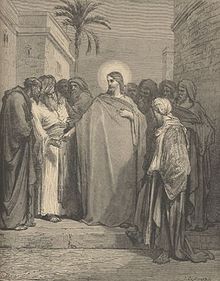
At the feast, Jesus is the “talk of the town,” receiving both favorable and unfavorable reports; everyone gossips cautiously to avoid rebuke from the Jewish leadership (vv. 11-13).
In the middle of the feast, Jesus goes into the temple and begins to teach (v. 14).
The leadership knows that He has not had rabbinical training; they know He neither abides by their rhetorical rules nor speaks their party line (v. 15).
[This occasion must have been the first time they heard Him speak; otherwise, they would have already known about His wisdom.]
Though Jesus’ doctrine must necessarily have been the same as the Father’s, the Lord takes the position of humble servant and speaks only what His Father gives to Him, deriving His authority only from God.
By being willing to do what He says, the individual believer will understand that Jesus’ doctrine is from God and is not human (vv. 16-17).
Christ informs the Jews that He does not seek honor from men; by seeking to honor the Father, He proclaims His own truth and righteousness (v. 18).
According to Jesus, the Jews are unrighteous because they disregard Moses’ commandments by seeking to kill Him (v. 19).
Being thus put on the defensive, the leaders immediately deny this accusation and claim that Jesus is demonized (v. 20).
The “one work” that has caused the Jews to marvel is the healing of the man on the Sabbath (v. 21; cf. 5:1-9 and v. 23).
[When Jesus cites Moses as the teacher who gave the Israelites the law of circumcision (v. 22), He meant that Moses is the one who recorded this law in Torah; Abraham actually received it from God (v. 22b; cf. Gen. 17:9-14).]
Jesus argues that if God permits circumcision on the eighth day of a newborn’s life (even though that particular day may be a Sabbath), then the Jews should have no dispute with Him because He healed a man on that day (v. 23; cf. Lev. 12:3).
Judge With Righteous Judgment
view quiz statisticsJudge Righteously
The Lord then summarizes His teaching, admonishing the Jews to judge people not according to the way things appear, but according to the way things truly are.
In other words, they must first ferret out and scrutinize all the objective evidence before passing judgment (v. 24).
The self-contradictory question of the leadership (v. 20b) confuses “some of them from Jerusalem,” for the former had identified Jesus as the One Whom they sought to kill; now “they say nothing to Him” when “He speaks boldly” (vv. 25-26a).
Those from Jerusalem wonder why the leadership does not seize Him: “Might it be because they believe Him to be the Messiah?” (v. 26b).
They, on their part, do not believe in Jesus’ Messianic claim because they know that He comes from Nazareth; this fact does not fit their preconceived notion that the Messiah would be a mystery Person coming out of nowhere (v. 27; cf. Ryrie, New Testament Study Bible, 176).
Jesus acknowledges that those from Jerusalem know Who He is and where He is from (that is, they know His hometown); nevertheless, they do not understand that He is the Sent-One of the true God Whom they do not know but Whom He knows, “for I am from Him” (vv. 28-29).
His assertion that they do not know God causes them to turn against Him; however, their attempt to arrest Him does not succeed at this time because “His hour had not yet come” (v. 30; cf. vv. 6, 8).
While some oppose Christ, many believe in Him, having concluded that His “signs” have proven His Messianic claim (v. 31).
Sensing the tide turning against them, the Jewish leadership now seeks to arrest Him again (v. 32).
Their officers, however, do not succeed, for Jesus stops them in their tracks with some enigmatic statements that inform them that He is soon going where they cannot come (vv. 33-34).
Intrigued, but also perturbed, the Jews discuss Jesus’ assertions among themselves, but they do not understand what they mean (vv. 35-36).
Pentecost
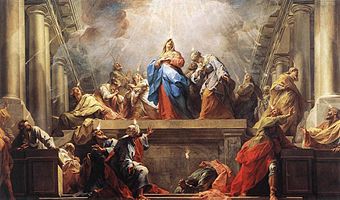
A few days later—on the eighth day of the Feast—Jesus makes an astounding claim, offering “living water” to anyone who thirsts.
He links coming to Him for a drink and believing in Him as synonymous concepts; the promised result (new life) fulfills OT Scripture (vv. 37-38; cf. 4:10; Is. 55:1; Ryrie, New Testament Study Bible 176).
The Apostle John then explains that the Lord’s reference to “rivers of living waters” points to the “giving” of the Holy Spirit on the day of Pentecost after Jesus’ glorification (v. 39).
Jesus' Identity
Whom do you believe Jesus to be?
The True Identity of Jesus
Jewish popular opinion about Jesus’ identity varies from group to group.
One crowd calls Him “the Prophet” (v. 40; cf. Deuteronomy 18:15-18).
[Correct, but they perceived the Prophet as a different personage than the Messiah. Therefore, they did not know that Jesus was their God.]
Another faction labels Him as the Christ (v. 41).
[Perhaps correct, unless they saw the Christ only as the military leader/king who would deliver them from the Romans.]
A final group understands correctly that the Christ would come out of Bethlehem, not Galilee (vv. 41-42).
[They obviously did not know that Jesus was born in Bethlehem.
Did not the Scriptures also say that “Galilee of the Gentiles” would see a great light (Is. 9:1-2)]?
Thus, the division among people regarding Jesus’ identity begins (v. 43).
[It continues to this day.]
Verse forty-four appears somewhat ambiguous. Does John mean that some wanted to take Him to be king or to take Him into custody?
Regardless of the correct view, neither group succeeds.
Division also exists among the Jewish leadership.
When the anti-Jesus faction learns that the officers could not arrest Jesus because they were too astounded by His eloquence and wisdom (vv. 45-46; cf. 7:32ff), the "Jews" accuse the soldiers of being hoodwinked and the Scripturally ignorant am haarets of being cursed, thus elevating themselves to a position of being too wise and intelligent to be fooled (vv. 47-48).
Nicodemus
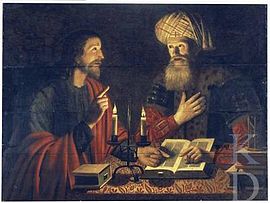
Nicodemus Stands Up for Jesus and Justice
Nicodemus (of John 3 infamy) courageously stands up for Jesus, and argues that they (he and his colleagues) should try the Lord legitimately before pronouncing Him guilty (vv. 50-51).
Taken aback by this contrary opinion, the other leaders turn on their fellow Pharisee, and imply by their rejoinder that "the teacher of Israel" (cf. 3:10) does not know Scripture either (v. 52).
[Their irrational hatred for Jesus has so consumed them that the Isaiah 9 passage—a clear reference to the Messiah’s relationship to Galilee—has conveniently slipped their minds.]
[With nothing resolved, the Pharisees return to their homes; Jesus, on the other hand, spends the night on the Mount of Olives, having no place to lay His head.
Was this affront a failure of Jewish hospitality? (7:53-8:1).
Nestle version editors did not include these two verses, not believing them to be in the original text].
© 2014 glynch1

